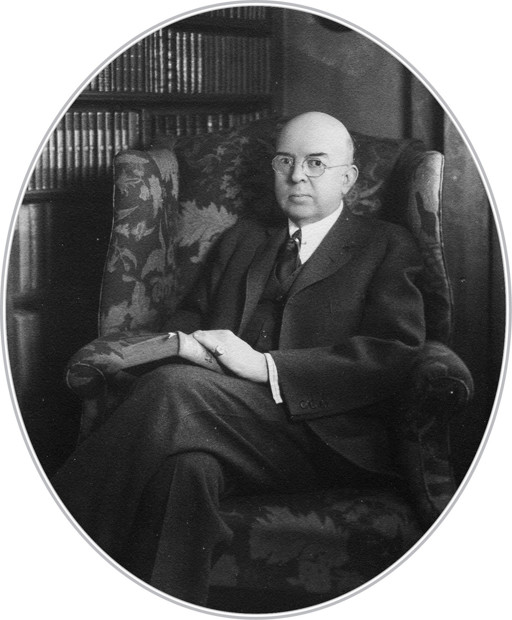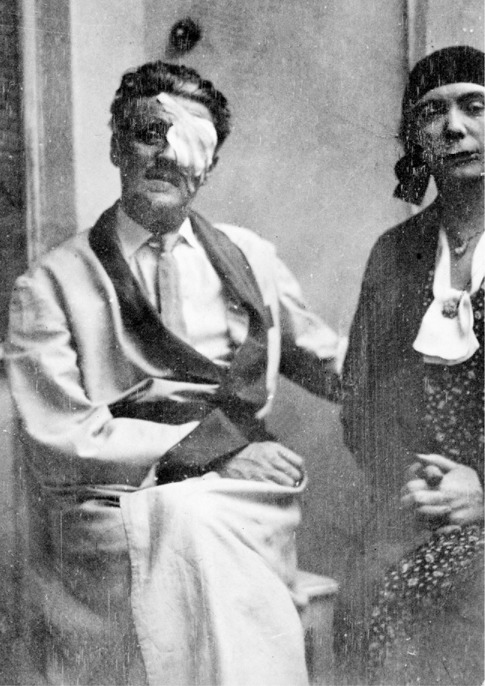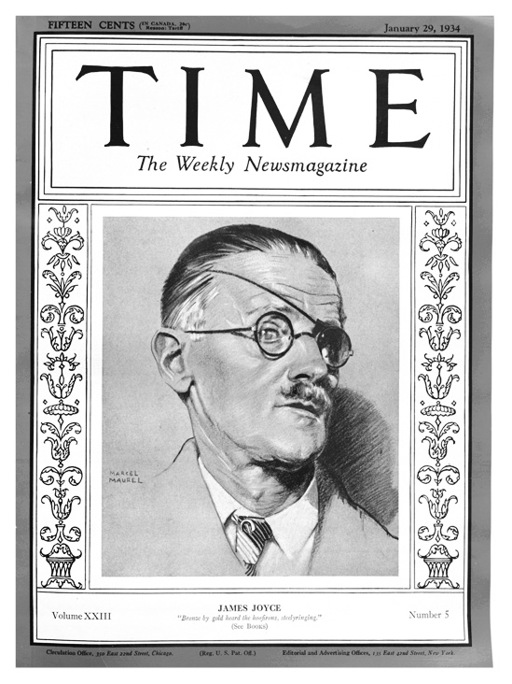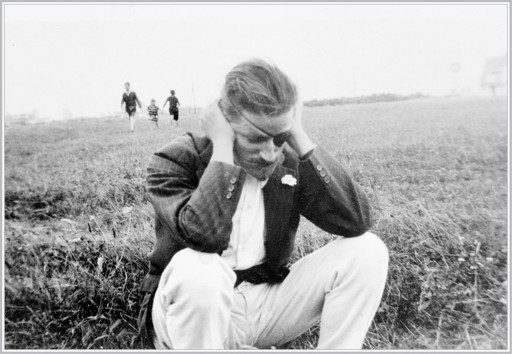The Most Dangerous Book: The Battle for James Joyce’s Ulysses (52 page)
Read The Most Dangerous Book: The Battle for James Joyce’s Ulysses Online
Authors: Kevin Birmingham

BOOK: The Most Dangerous Book: The Battle for James Joyce’s Ulysses
8.11Mb size Format: txt, pdf, ePub
Random House co-founder Bennett Cerf and Ernst orchestrated the 1933 federal court case by importing one copy of
Ulysses
from Paris.
Ulysses
, Cerf said, was Random House’s “first really important trade publication.”
© Bettman/CORBIS

Judge John Woolsey in New York, circa 1931. Woolsey’s famous 1933 decision effectively legalized Joyce’s novel in the United States.

Nora Barnacle with Joyce after eye surgery in 1930. Joyce endured at least eleven surgeries to save his eyesight.

The legalization of
Ulysses
gave Joyce widespread attention.

James Joyce circa 1922.
ACKNOWLEDGMENTS
Perhaps the only way in which I resemble Joyce is that I have collected many debts. I am grateful to Suzanne Gluck, my agent, for her support, energy and confidence as well as her unfailingly good advice over the years. I owe a tremendous debt to my editor, Ginny Smith, for her instinct and her careful attention to my writing in draft after interminable draft. This book owes so much to her. Nick Trautwein’s faith in the early stages was inspiring and helped me to see this book’s possibilities, and this project would not have happened without Matthew Pearl’s encouragement, advocacy and support from the very beginning. Our conversations over coffee and more colorful drinks buoyed me through the challenges. I owe a debt of gratitude to everyone at Penguin Press, including Kaitlyn Flynn, Sofia Groopman, Patricia Nicolescu and, for their legal advice, Marlene Glazer, Emily Condlin and Karen Mayer. I would also like to thank the staff at William Morris Endeavor, including the ever-helpful Eve Attermann and Caroline Donofrio.
Several people have been kind enough to read drafts, and I’m grateful for their comments and advice as the manuscript took shape. Bob Kiely, J. D. Connor and Alan Friedman read either drafts or excerpts and were all encouraging. Eric Idsvoog and Michelle Syba as well as Samantha Frank at William Morris subjected themselves to more than one complete draft. Louis Menand gave me invaluable comments and suggestions on the manuscript long after he thought his days advising me were over.
I am grateful for the expertise of the countless librarians, archivists and curators who helped during the research process, but there are several whose names deserve special recognition. Thomas Lannon and Tal Nadan helped with several questions regarding the extensive John Quinn collection at the New York Public Library, and they both went to great lengths to help track down elusive items. Alison Greenlee and Nicholas Geiger at the University of Tulsa guided me through the Ellmann Collection, and I could not have used it without them. James Maynard at the University of Buffalo helped answer my questions over several days and responded to my belated requests and questions. Simone Munson helped me navigate the John Saxton Sumner papers at the Wisconsin Historical Society in Madison, and she went through the trouble of duplicating hundreds of pages for my use. Liam Kelly at the National Transport Museum of Ireland provided photographs and information about 1904 Dublin trams, and Richard Tuske supplied me with details about the Byrne Room in the old New York City Bar Association building. I received extraordinary assistance from Gabriel Swift at Princeton; Mandy Wise at University College London; Zoe Stansell at the British Library; William Creech at the National Archives and Records Administration in Washington, D.C., and Alex Johnston at the University of Delaware. Julia Whelan at the Countway Library of Medicine at the Harvard Medical School and Jack Eckert at the Center of the History of Medicine helped me navigate the esoteric world of pharmacopeias and early twentieth-century medications. Asim Ahmed advised me about my questions regarding epidemiology and infectious diseases, and Allan Brandt and Ariel Otero provided medical commentary on an early draft of my evaluation of Joyce’s medical history.
The Fuerbringer Summer Faculty Grant helped support my research in various archives during three summers, and during the fall and spring the History & Literature faculty at Harvard provided research ideas, conversation and much-needed happy-hour drinks. I have presented some of this work to the Hist & Lit faculty colloquium, and I’m grateful for the feedback and guidance I received. Robert Spoo offered his expertise on Joyce, Samuel Roth on the intricacies of copyright law. Judge John Woolsey would not be alive in these pages were it not for the help of Anna Henchman and Steven Biel, who put me in touch with members of the Woolsey family, including Mary Woolsey. Peggy Brooks kindly spent an afternoon discussing her memories of the judge and provided me with documents and information I could not have obtained elsewhere. The most generous assistance with the life of Woolsey came from the judge’s grandson. John Woolsey III shared countless family documents with me over the years, and (as if that were not enough) he graciously invited me to Petersham to spend the day visiting the judge’s library. We celebrated Bloomsday Eve 2010 eating sandwiches on the hillside where the legalization of
Ulysses
in the United States began.
Ulysses
in the United States began.
I’ve had the great fortune of working with three wonderful and dedicated research assistants over the years: Emma Wood, Rachel Wong and Caroline Trusty. They helped with various aspects of the project and tracked down answers to my ever-growing list of questions about everything from census records and currency conversions to the weather on particular days nearly a century ago. I want to give special thanks to Mathilda Hills and Jackson R. Byer, for their thoughts and help regarding Margaret Anderson; to Julie Ahrens and the Stanford Fair Use Project, for their counsel about copyright; to Miriam Otero, for transcribing archival letters filled with crabbed handwriting; to Lisa E. Smith, for her energetic pursuit of an unpublished document; to Louis Hyman and Katherine Howe, for their friendship and their generous hospitality in New York; to Amy Maguire, for her support and understanding during the most hectic months; to the wonderful baristas of Cambridge, for keeping me caffeinated; to the members of an intrepid
Ulysses
book club (Katrin Holzhaus, Eric Idsvoog, Ana Ivkovic and Sean Smith), for untangling some of the mysteries of June 16, 1904; to many other friends—too numerous to name—for keeping me sane; to my students, for keeping me on my toes, for inspiring me, and for reminding me that history and literature are worth everything you put into them; to my mother, for being my mother, and to my dad. I still have your copy of
Dubliners
.
Ulysses
book club (Katrin Holzhaus, Eric Idsvoog, Ana Ivkovic and Sean Smith), for untangling some of the mysteries of June 16, 1904; to many other friends—too numerous to name—for keeping me sane; to my students, for keeping me on my toes, for inspiring me, and for reminding me that history and literature are worth everything you put into them; to my mother, for being my mother, and to my dad. I still have your copy of
Dubliners
.
NOTES
ABBREVIATIONS OF ARCHIVES
BL:
Harriet Shaw Weaver Papers, British Library, London
BNA:
National Archives, London
Buffalo:
James Joyce Collection, Poetry Collection of the University Libraries, University at Buffalo, State University of New York
Cerf Papers:
Bennett Cerf Papers, Rare Book and Manuscript Library, Columbia University
Cornell:
James Joyce Collection, #4609. Division of Rare and Manuscript Collections, Cornell University Library
Delaware:
Florence Reynolds Collection Related to Jane Heap and
The Little Review
, Special Collections, University of Delaware Library, Newark, Delaware
Ernst Papers:
Morris Ernst Collection, Harry Ransom Humanities Research Center, University of Texas at Austin
HRC:
Harry Ransom Humanities Research Center, University of Texas at Austin
NARA:
National Archives and Records Administration, Washington, D.C.
NLI:
James Joyce Papers, National Library of Ireland, Dublin
NYPL:
John Quinn Papers, Manuscripts and Archives Division, New York Public Library, Astor, Lenox, and Tilden Foundations
Roth Papers:
Samuel Roth Collection, Rare Book and Manuscript Library, Columbia University
SBP:
Sylvia Beach Papers, Firestone Library, Princeton University
SIU:
Gorman Papers, Harley Croessmann Collection, Special Collections Research Center, Morris Library, Southern Illinois University–Carbondale
Tulsa:
Richard Ellmann Collection, University of Tulsa
UCL:
James Joyce Collection, Lidderdale Papers, University College, London
UWM:
Little Review
Records, University of Wisconsin–Milwaukee
WHS:
John Saxton Sumner Papers, Wisconsin Historical Society, Madison
Yale Anderson:
Elizabeth Jenks Clark Collection of Margaret Anderson, Beinecke Rare Book and Manuscript Library, Yale University
Yale Pound:
Ezra Pound Papers, Yale Collection of American Literature, Beinecke Rare Book and Manuscript Library, Yale University
Yale Joyce:
James Joyce Papers, Beinecke Rare Book and Manuscript Library, Yale University
ABBREVIATIONS OF BOOKS AND PERIODICALS
DMW
:
Jane Lidderdale and Mary Nicholson,
Dear Miss Weaver: Harriet Shaw Weaver, 1876–1961
Ell:
Richard Ellmann,
James Joyce
, revised edition (New York: Oxford UP, 1982)
EP/JJ
:
Pound/Joyce: The Letters of Ezra Pound to James Joyce
EP/JQ
:
Letters of Ezra Pound to John Quinn
JJ/SB
:
James Joyce’s Letters to Sylvia Beach, 1921–1940
Other books
The Destruction of the World by Fire by Shiden Kanzaki
Dangerous by Jacquelyn Frank
Suspicions by Sasha Campbell
Escapes! by Laura Scandiffio
Between a Book and a Hard Place by Denise Swanson
Oil Patch Romance (Mail Order Bride Series) by Susan Leigh Carlton
Beverly Jenkins by Destiny's Surrender
Through the Static by Jeanette Grey
Island of Secrets by Carolyn Keene
The 39 Clues Unstoppable Book 3 Countdown by Natalie Standiford
